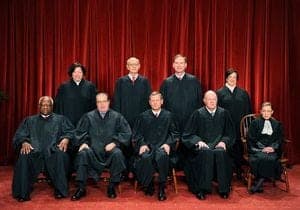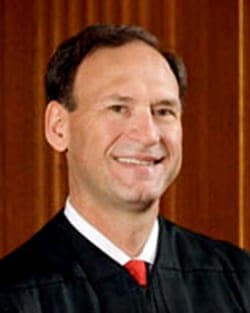Let's first be clear about one thing: This case did nothing to the individual mandate. Nor did it challenge the underlying legality of the Affordable Care Act itself. Whatever your opinion of that law, this case could never be the vehicle of its undoing.
The legal question was whether Obamacare's contraceptives requirement violated a law called the Religious Freedom Restoration Act, or RFRA. RFRA, passed in 1993 and signed by President Clinton, was the culmination of a 40 year legal struggle about religious exemptions: if you feel a general law forces you to violate your religious beliefs, can you be exempt from that law?
RFRA gave religious objectors a statutory presumption of exemption: the default would be that persons could demand an exemption if the government's law substantially burdened your ability to exercise your freedom of religion.
But Hobby Lobby gives us something different. RFRA never said that it applied to corporations, but today, the Court, as it did in Citizens United, concluded that Congress wrote RFRA with the standard rule in law that corporations are people, too. Lawyers and law students are familiar with the corporation-as-person fiction. It pops up in first year civil procedure classes. However, privileging corporations as persons for the purposes of freedom of speech and religion was unprecedented and unthinkable before the Roberts Court.
 Justice Ginsburg noted this in her strong dissent:
Justice Ginsburg noted this in her strong dissent:
The reason why "religious exemptions had never been extended to any entity operating in 'the commercial, profit-making world"
is hardly obscure. Religious organizations exist to foster the interests of persons subscribing to the same religious faith. Not so of for-profit corporations. Workers who sustain the operations of those corporations commonly are not drawn from one religious community. Indeed, by law, no religion-based criterion can restrict the work force of for-profit corporations… The distinction between a community made up of believers in the same religion and one embracing persons of diverse beliefs, clear as it is, constantly escapes the Court's attention. One can only wonder why the Court shuts this key difference from sight.
The majority, in a decision written by Justice Alito, found that the Obamacare contraceptive requirement substantially burdened the religious freedom of the owners of Hobby Lobby. Otherwise, the Court argued, it would put families who want to go into business or who own a business already in an impossible situation: either get out of business or violate their interpretation of the word of God.
Never before has someone's particular interpretation of religious scripture been enshrined as law so as to affect so many innocent people.
Justice Ginsburg is right. By giving family-run companies the right to opt out of generally applicable laws, the Court has ignored the fact that it is privileging companies over persons, owners' religious beliefs over employees', the beliefs of those with greater access to capital and investment than those of the working poor. The decision is also illogical: corporations do not enjoy the exact same legal status as individual persons. Even if we limited the decision, as the Court attempts to, to closely-held, family-run corporations that are "extensions" of the owners, there is no logical reason why we should stop there. For-profit public companies are "persons" for the purposes of being hauled into court and being served notice of process. It is not clear to me how the Court majority expects to limit its decision to the Hobby Lobbys of the world when there are many other religious people out there aching to use their religion as a pretext to cut costs, discriminate against women and gays, and maintain a stranglehold on the old order.
 The decision will open the federal courts to a flood of challenges by corporations and not just religion-based challenges. The Court basically concluded that closely-held corporations are persons for the purposes of religious exercise, just like all corporations are when it comes to speech. If they are persons, they have all the rights of persons. This decision could be broad depending, as is always the case, on how future appellate and district courts interpret it.
The decision will open the federal courts to a flood of challenges by corporations and not just religion-based challenges. The Court basically concluded that closely-held corporations are persons for the purposes of religious exercise, just like all corporations are when it comes to speech. If they are persons, they have all the rights of persons. This decision could be broad depending, as is always the case, on how future appellate and district courts interpret it.
Therein lies the danger for the LGBT community. The Court's conclusion that family-run companies can exempt themselves from generally applicable laws could allow a family-run bakery to humiliate and discriminate against a gay couple looking for a cake for an upcoming marriage. It may allow a for-profit catering hall with no connection to a church to claim that its owners belief in the truth of Leviticus allows them to kick out two lesbians who want to get married there. It may allow companies to fire their employees for being gay even in states that ban such discrimination. It may allow a donut hole to be eaten out from full LGBT equality, consigning us to second-class citizenship in the name of pretextual religious freedom.
Of course, Justice Alito and his conservative colleagues are quick to argue that their decision did not go that far. Hobby Lobby applies only to family-run companies and only in the contraceptives context. But make no mistake: the reach of this decision could be vast. Just like the post-Windsor winning streak has shown the reach of the Supreme Court's decision striking down DOMA, we will only start seeing a small percentage of the effects of Hobby Lobby when the lower courts give us their first interpretations. The real effects may go unseen: they will be in the health care plans dropped, in the increased health care expenses seen by women, in the lack of access to birth control, and, most ominously, in the continued restriction of choices women have when it comes to protecting their bodies and health. The effects may also be seen in an erosion of LGBT equality.
***
Follow me on Twitter and on Facebook.
Ari Ezra Waldman is a professor of law and the Director of the Institute for Information Law and Policy at New York Law School and is concurrently getting his PhD at Columbia University in New York City. He is a 2002 graduate of Harvard College and a 2005 graduate of Harvard Law School. Ari writes weekly posts on law and various LGBT issues.



